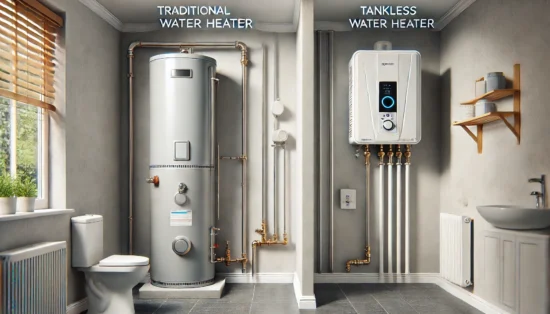When it comes to water heaters, homeowners often face a crucial decision: should they stick with a traditional tank water heater or upgrade to a tankless model? Both have their benefits and drawbacks, and the choice largely depends on your household’s needs, budget, and long-term goals. At Roto-Rooter, we’re here to help you weigh the options and make an informed decision.
Traditional Water Heaters: The Classic Choice
A traditional water heater uses a tank to store and heat water, ensuring there’s a supply of hot water readily available when needed.
Pros:

1. Lower Initial Cost: Traditional water heaters are typically more affordable upfront.
2. Simple Installation: Most homes are already set up for a tank-style heater, which makes installation straightforward.
3. Reliable Supply: With a properly sized tank, you can have enough hot water for multiple tasks, like running the dishwasher and taking a shower simultaneously.
Cons:
1. Limited Hot Water: Once the hot water in the tank runs out, you’ll need to wait for it to refill and reheat.
2. Energy Inefficiency: Tanks continuously heat water to maintain the set temperature, even when you’re not using it.
3. Lifespan: On average, traditional water heaters last 8-12 years.
Tankless Water Heaters: The Modern Upgrade
Tankless water heaters, also known as on-demand water heaters, heat water as it flows through the system, eliminating the need for a storage tank.
Pros:
1. Energy Efficiency: Tankless systems only heat water when it’s needed, which can lead to significant energy savings.
2. Unlimited Hot Water: Since water is heated on demand, you’ll never run out of hot water.
3. Longer Lifespan: Tankless units typically last 20+ years with proper maintenance.
4. Space-Saving Design: Without a bulky tank, these systems take up less space, making them ideal for smaller homes.
Cons:
1. Higher Upfront Cost: Tankless units and their installation can be more expensive than traditional models.
2. Flow Rate Limitations: If multiple fixtures demand hot water simultaneously, the system may struggle to keep up unless it’s properly sized.
3. Maintenance: Tankless water heaters are more sensitive to mineral buildup and may require regular descaling, especially in areas with hard water.
Which One is Right for You?
Here are some key factors to consider when deciding between a tank and tankless water heater:
• Household Size: Larger families may benefit from a traditional tank for its capacity or a high-powered tankless unit to meet simultaneous demands.
• Energy Usage: If energy efficiency and long-term savings are priorities, a tankless model is a clear winner.
• Budget: Consider both upfront costs and long-term expenses, including energy bills and maintenance.
• Space: A tankless unit is ideal if you’re tight on space or remodeling your home.
• Water Usage Habits: Frequent, high-demand hot water usage may require a larger traditional tank or a robust tankless system.
Need Help Deciding? Call Roto-Rooter!
Whether you’re looking to install a new water heater or replace an old one, Roto-Rooter has the expertise to guide you through the process. Our experienced technicians will assess your home’s needs, recommend the best option, and ensure a seamless installation.
Ready to upgrade your water heater? Contact Roto-Rooter today to schedule a consultation!